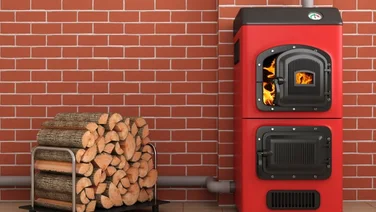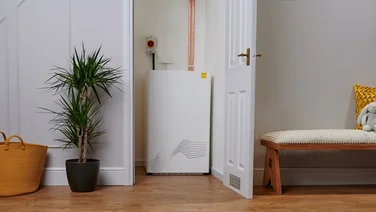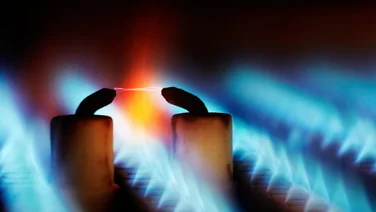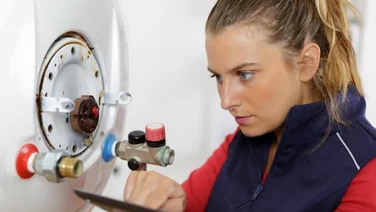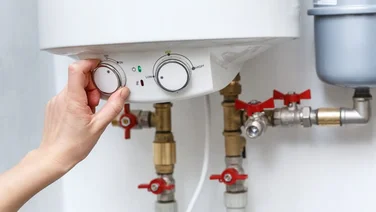- The oil boiler phase-out could affect up to 1.5 million UK households
- You might need to replace your oil boiler with a greener alternative
- The Boiler Upgrade Scheme can give you up to £7,500 for a heat pump
6% of UK households rely on an oil boiler for their heating needs, because they’re unable to connect to mains gas and use a gas boiler.
With 80% of the UK’s oil boilers being phased out by 2035, 1.5 million households could be looking for a different way to heat their homes (check out the cost of a new boiler).
If this includes you, our guide on how to prepare for the oil boiler phase-out in 2035 will give you everything you’ll need to know.
You could always start looking for a new electric boiler, which you can do by filling in this simple form. Just enter a few details and we’ll put you in touch with our trusted suppliers. They’ll get in touch after a short while with bespoke quotes for you to compare.

What is the oil boiler phase-out and when will it happen?
80% of the UK’s oil boilers are being phased out by 2035, which would leave up to 6% of UK households needing to find a replacement heating method.
That could mean buying a new gas boiler, but as the majority of these households are disconnected from the gas grid, they would have to look at other heating methods.
Many people in rural areas might either have to spend thousands of pounds finding an alternative, or convert an existing boiler to run on (relatively) greener biofuels such as Hydrotreated Vegetable Oil (HVO). Converting an oil boiler to run on HVO is quick and undisruptive, and can lead to an 88% reduction in carbon emissions.
BioLPG is a more eco-friendly variant of LPG, which is gas that exists in a liquid form. It produces 38% fewer emissions than ordinary heating oil, but is less efficient, meaning you’ll use more fuel to keep your home warm.

What would an oil boiler phase-out actually mean for off-grid households?
It would mean no longer being able to heat your home with either a new or replacement oil boiler.
Homes would have to spend potentially thousands of pounds on a different heating system – which for many rural households will be a challenge.
And apart from the Boiler Upgrade Scheme, there are currently no plans from the government to help households replace their existing oil boilers.
It’s not clear how the government could enforce a phase-out, other than stating that homes would be required to replace or convert their existing oil boiler to a low-carbon alternative.
There may be property inspections, or you may have to submit information about your replacement or converted heating system. We’ll update this page when the government releases more details.
What are the alternatives to an oil boiler?
If the ban goes ahead and you need to find an alternative to an oil boiler, consider some of the options below. We’ve opted against including gas boilers, because of their less-than-eco-friendly credentials, and because it’s highly likely the government will outright ban them in the future in its push to reach net zero emissions.
There’s also the option of converting an oil boiler to run on Hydrotreated Vegetable Oil (HVO), which would make an existing oil boiler much greener. It wouldn’t make it carbon neutral, however.
Heat pump
| Heat pump type | Cost including installation | Cost with Boiler Upgrade Scheme |
|---|---|---|
| Air source heat pump | £10,000 | £5,000 |
| Ground source heat pump | £24,000 without boreholes, £49,000 with boreholes | £18,000 without boreholes, £43,000 with boreholes |
| Water source heat pump | £10,000 | £4,000 |
Heat pumps are eco-friendly home-heating systems that run on electricity instead of fossil fuels, and work by extracting warmth from the air outside, the ground, or water.
If you can operate your heat pump on electricity generated by solar panels, you can have a 100% sustainable way of heating your home.
The best way to cut your energy bills long term is to install solar panels. If you’re wondering ‘how much are solar panels?‘ check out our dedicated costs page.
Heat pumps are very efficient too, averaging an efficiency rating of 300%. This means it converts one unit of electricity into three units of heat, which is much higher than the 94% max efficiency of modern gas boilers.
Some models can reach 400%, or in the case of water heat pumps, as high as 600% efficiency.
Electric boiler
Typical cost including installation: £3,350
Electric boilers work just like ordinary boilers, only they’re powered entirely by electricity. That makes them much better for the environment, because they produce far fewer carbon emissions.
Combining an electric boiler with a sustainable energy source, such as solar panels or even a small wind turbine, makes it a very green way to keep warm.
Electric boilers are generally not suitable for larger properties, because they cannot meet the higher central heating and hot water demands, but they may be perfect for your home.
Biomass boiler
Typical cost including installation: £16,000, or £11,000 with Boiler Upgrade Scheme
Biomass boilers are powered by burning waste material, typically wood, in the form of pellets, chips, or logs.
They’re better for the environment than oil boilers, but still produce carbon emissions because they need to burn fuel to work.
Solar thermal panels
Typical cost including installation: £4,000
You can heat your water with solar power using solar thermal panels, but they’re not yet powerful enough to replace a home-heating system entirely.
They’ll be more than fine for heating a shower and providing hot water from a tap, just not for keeping your home warm — especially in the winter when sunlight hours are limited.
Infrared heating panels
Typical cost including installation: £6,000 for three-bedroom home
Infrared heating panels are one of the hot new ways of heating your home. They function just like the heating lamps you’ll find in pub gardens or some bathrooms, but are packaged as sleek panels which are typically only a centimetre thick.
You can place them on a wall, on the ceiling, or in a bathroom disguised as a mirror. There are even infrared panels you can decorate with a stylish photo or other image of your choosing.
They heat your home by emitting a harmless infrared radiation that warms the surface of any object it comes into contact with.
If you have an infrared heating panel on the ceiling, it’ll radiate warmth around the entire room. Infrared heating panels on a wall will need a clear line of sight to work properly, so don’t place yours behind a sofa or wardrobe.
You can’t efficiently heat water with infrared however, meaning you’ll have to find an alternative way to do so, like a hot water cylinder.
Are there any government grants for oil boilers?
There are no government grants for oil boilers, as they’re part of the government’s upcoming ban on gas and oil-powered boilers.
It’ll first be implemented in new-build homes in 2025, then in all properties by 2035. Unfortunately, off-grid homes that rely on oil boilers cannot replace one with a like-for-like oil boiler after 2026.
That leaves around 1.5 million UK households with just four years to find a proper replacement, or switch to bioLPG or the more eco-friendly HVO.
What is bioLPG?
BioLPG is similar to LPG, only it’s much better for the environment, as it’s produced from organic waste, residues, and sustainably sourced materials, instead of crude oil.
Running an oil boiler with bioLPG means reducing your emissions by 38%, compared to oil. BioLPG’s downside is that it’s less efficient than both ordinary LPG and oil, so you’ll end up using more fuel for the same amount of heating.
Summary
A phase-out of 80% of the UK’s oil boilers by 2035 would make life difficult for millions of people, unless the government steps in with a plan to help them switch to greener heating methods.
Apart from the Boiler Upgrade Scheme, which only covers 90,000 UK households, there is no financial support for the 1.5 million homes who face having to replace their oil boilers.
So while it’s good to see the government phasing out polluting oil boilers, the reality is that alternative systems such as heat pumps are big investments that don’t break even for a long time — or ever, in the case of ground source heat pumps.
If you’re ready to start looking for a new home heating system, you can always fill in this simple form for electric boiler quotes. Just enter a few details to find out what a new electric boiler might cost you.

